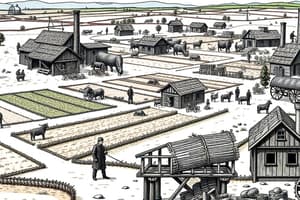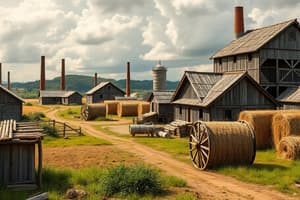Podcast
Questions and Answers
What led to the emergence of factories and mass production during the Industrial Revolution?
What led to the emergence of factories and mass production during the Industrial Revolution?
- Development of steam power (correct)
- Advances in communication technology
- Increased trade and commerce
- Innovations in agricultural production
How did the Agricultural Revolution contribute to the Industrial Revolution?
How did the Agricultural Revolution contribute to the Industrial Revolution?
- It freed up labor for industrial activities (correct)
- It led to a decline in food production, causing widespread famine
- It increased the demand for industrial goods
- It reduced the need for new technologies
What were some long-term consequences of the Industrial Revolution?
What were some long-term consequences of the Industrial Revolution?
- The decline of urban centers and the rise of rural communities
- The decline of the textile industry
- The growth of international trade and globalization (correct)
- The development of more efficient agricultural practices
What were some short-term consequences of the Industrial Revolution?
What were some short-term consequences of the Industrial Revolution?
What was a significant factor in the emergence of the Industrial Revolution?
What was a significant factor in the emergence of the Industrial Revolution?
Flashcards are hidden until you start studying
Study Notes
What is a Revolution?
- A revolution is a fundamental change in the way people live, work, and organize their societies
Causes of the Industrial Revolution
- Mainly occurred in Britain in the late 18th and early 19th centuries
- Factors contributing to the Industrial Revolution:
- Innovations in textile production (spinning jenny, water frame)
- Development of steam power (James Watt's steam engine)
- Availability of natural resources (coal, iron)
- Improvements in transportation (canals, railways)
- Growth of international trade
- Social and economic changes (emergence of a wealthy middle class)
Agricultural Revolution's Contribution to the Industrial Revolution
- Agricultural innovations ( enclosure movement, crop rotation, iron plows) led to:
- Increased food production
- Population growth and urbanization
- Surplus labor available for industrial work
- Growing demand for industrial goods
Consequences of the Industrial Revolution
Short-term Consequences
- Creation of new social classes (industrialists, factory workers)
- Urbanization and growth of cities
- Development of transportation networks
Long-term Consequences
- Transformation of the global economy
- Emergence of new forms of energy and technologies
- Changes in social relationships and family structures
- Growth of international trade and globalization
Studying That Suits You
Use AI to generate personalized quizzes and flashcards to suit your learning preferences.





